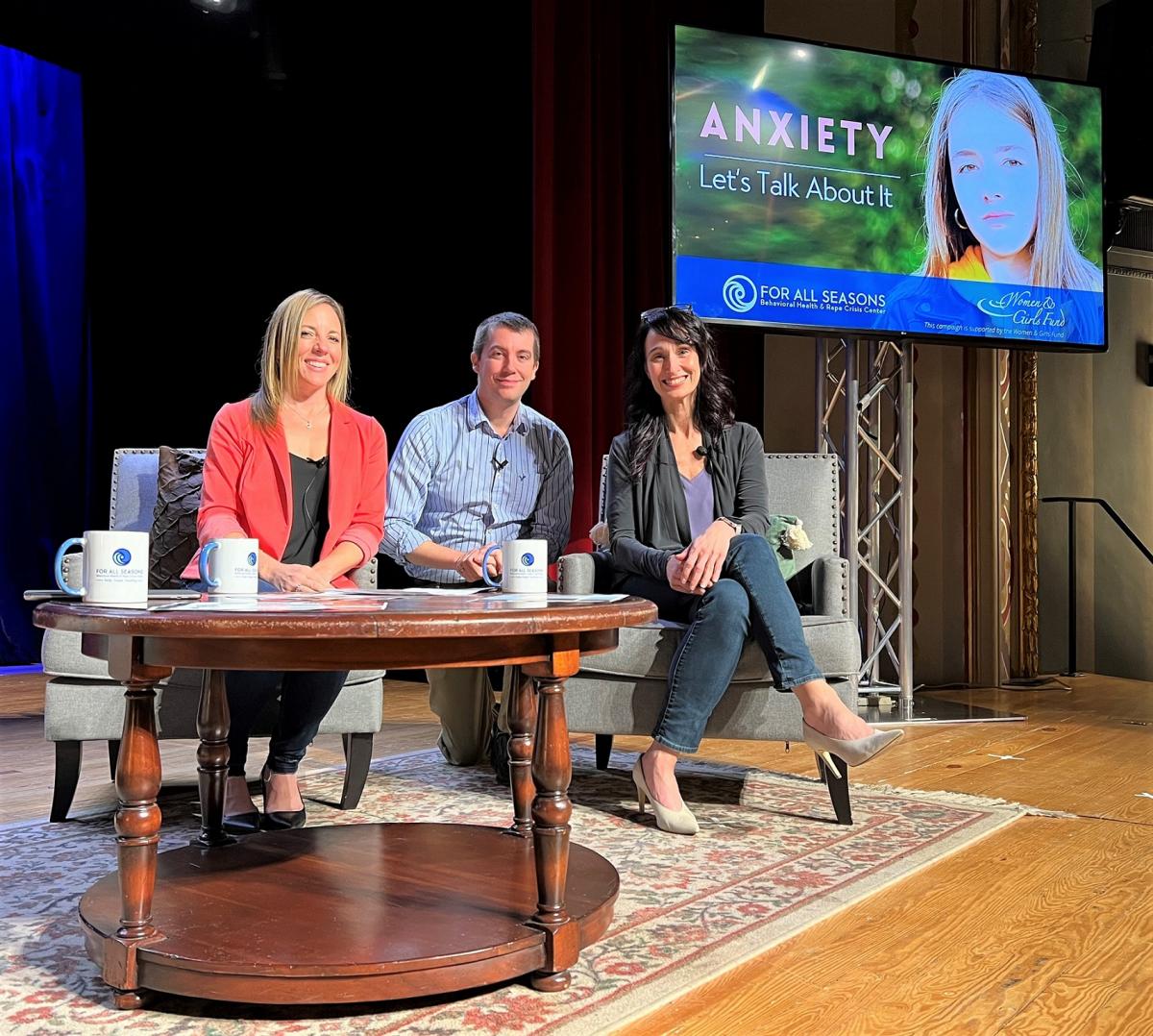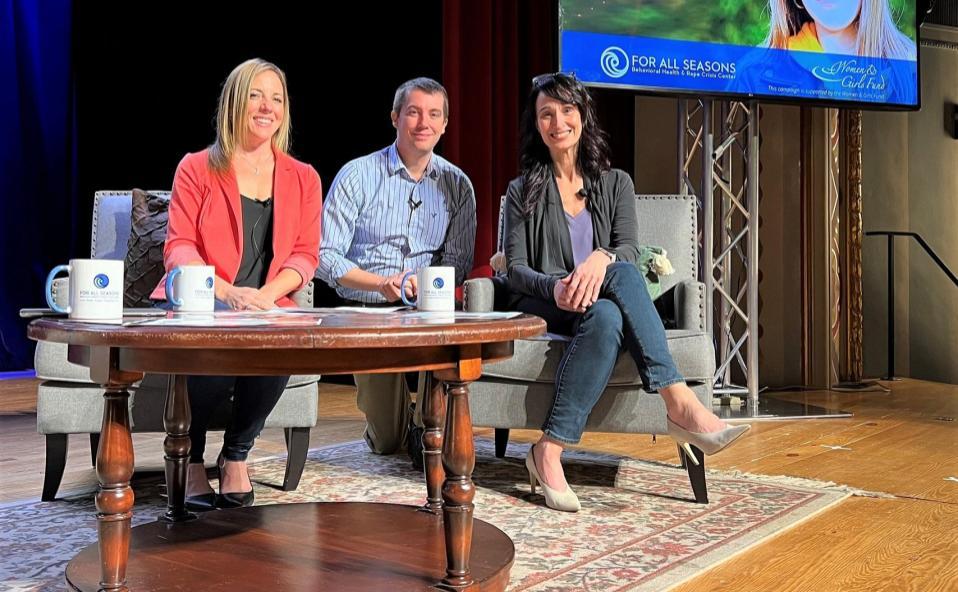
L-R: Beth Anne Langrell, CEO of For All Seasons; Moderator Bruce Grove, QACTV; and Lesa Lee, LCSW-C, Chief Clinical Officer of For All Seasons.
On February 10, For All Seasons hosted a FREE lecture, “Anxiety – Let’s Talk About It,” at the Avalon Theatre in Easton, MD and through Facebook live stream. The lecture featured For All Seasons’ CEO, Beth Anne Langrell, and Chief Clinical Officer, Lesa Lee, LCSW-C who presented on the anxiety challenge teen girls face, and the ways we can support them on their journey to wellness. The lecture was moderated by QACTV host Bruce Grove and recorded and live-streamed by MCTV.
Several recent statistics about anxiety have raised concern in the mental health community. The National Institute for Mental Health showed that 38% of female adolescents suffer from anxiety disorder, versus 26% for male adolescents. A report from August 2021 from the Morgan Stanley Alliance for Children’s Mental Health revealed how the pandemic has impacted all teens, with 40% of teens surveyed expressing concern about social anxiety during February and March of 2021.
“What we really want to do tonight is bring the conversation to the table about anxiety. We want to talk about what it is how it affects us. This program has been made possible with a grant that we received from The Women and Girls Fund. We are so grateful to them for recognizing this is an important topic. But we also want to bring some space and some acknowledgment that if there are teen girls in your lives, there are inevitably teen boys too. So, while our campaign is focused on teen girls, we also are going to talk about things that affect me, that affect you, that affect all of us, regardless of age and regardless of gender,” commented Langrell at the start of the presentation.
“We want you to hear from us that it’s okay to be feeling whatever you’re feeling and that it’s okay to reach out for help. A large part of what our agency has been doing over the pandemic and throughout the entirety of its existence is bringing to the attention of people that it’s okay not to be okay.”
Lee described anxiety as an internal feeling of worry, dread, or fear ranging from mild to extreme symptoms. She shared that the reactions and how anxiety presents itself can be different for everyone. She added that there are a number of the key areas of teens’ lives today that negatively impact their level of stress or anxiety.
“Women process stress and emotion and anxiety differently than boys do from the pure chemical makeup of our bodies. We need to pay attention to the reaction of our young people and not dismiss it as ‘it’s just dramatic’ or an overreaction. It’s really important to have the conversation and be able to give space so that our young people can have that conversation,” Langrell added.
For All Seasons also has released tools for the following key messages, including downloadable materials from the agency’s Center for Learning and video content. During the lecture, Langrell and Lee discussed the campaign’s five key messages, which can help teenage girls manage their anxiety on their journey to feeling more resilient to life’s stressors.
- When anxiety appears, ask yourself why? Identifying and understanding why you feel anxious can help you stay in control of overwhelming feelings and manage overwhelming feelings.
- I am not my anxiety. It’s important to recognize your anxiety may be a part of you, but it does not define you.
- Mindfulness helps to reduce anxiety. When you begin to feel stressed, pause and take a few slow breaths. Practice being present and grounded in the moment.
- Social media can stir up anxiety. Consider how social media makes you feel. Ask yourself – how does this impact my life? Am I letting social media influence who I am and what I think?
- Self-care is not selfish. Find time for the activities that make you calm and happy.
Lee explained that it’s important to have the tools to step back and think about what’s happening when anxious feelings start to appear and evaluate why they are happening – what else might be happening in our life. She also invited the audience to consider that anxiety does not define who we are but rather is a part of what we feel.
The presentation stressed that mindfulness is a tool that can be used to help reduce anxiety. Langrell added, “It’s about being aware of what you need. Maybe it’s a ritual that starts or ends your day. Give yourself some attainable goals for creating mindful practices, but don’t change everything at once.”
She continued, “I think slowing down and being present is something we can all use, whether it’s because of anxiety or because of just daily life. Everyone does it differently and it changes as we learn and experiment with what’s going to work well for each of us.”
One of the key messages in this campaign focuses on how social media affects anxiety. Langrell stated, “It’s really important to think through how social media is affecting our young people. We really need to be talking with our children about how much time they are on social media and what types of activities are happening on most social media devices. The other important piece that we’ve learned through the pandemic is to not dismiss social media and electronics altogether because they also offer our kids an avenue to connect with one another. So, it might just be about setting boundaries and paying attention to when social media and/or electronics make your child feel different and talking about it.”
Lee added, “Another invitation to you is to try and experiment with the time you are on social media. How would your life be different? How would things change for you if you reduced it?”
Langrell concluded with the final message of the presentation about self-care and how necessary it is to take care of yourself, put yourself first and not feel guilty about it. Lee encouraged mothers to be a model of self-care for their daughters.
The presenters concluded with advice for parents and caregivers about when it’s time to seek help from professionals for anxiety issues. Lee suggested that when anxiety starts to impact school and work life in a way that it hasn’t before, creating significant changes in behaviors or interactions, then it may be time to reach out and get some support.
“The first thing is just to simply have the conversation, using open-ended questions like ‘Help me understand how your day was?’ or ‘Tell me about what happened in school today?’ to start a conversation. You don’t have to have the solution to the question that you’re asking,” summarized Langrell.
As a part of this campaign, For All Seasons has created a website with free resources, including videos and downloadable tools, to help young women gain the strategies they need, not just to survive, but to thrive. Community members can access these materials at www.anxiety-letstalkaboutit.org.
For All Seasons provides the highest quality mental health and victim services to children, adults, and families across Maryland’s Eastern Shore. Services are offered in both English and Spanish and include therapy, psychiatry, victim advocacy, 24-hour crisis hotlines, outreach, and community education. For further information, contact For All Seasons at 410-822-1018 or visit forallseasonsinc.org.



Write a Letter to the Editor on this Article
We encourage readers to offer their point of view on this article by submitting the following form. Editing is sometimes necessary and is done at the discretion of the editorial staff.